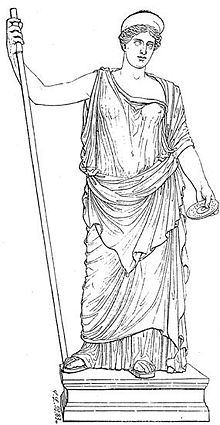Heraia
The Heraia ( Greek Ἡραῖα , also Heraen or Heraien ) were celebrations in ancient Greece in honor of Hera , the preserver of marriage and goddess of women. They were from the 6th century BC. Held in several Greek cities until the Roman Empire .
The Heraia were best known in Argos , the most important cult center of the Hera, where she was also the city goddess and the years were named after the name of her priestesses. Here Demetrios Poliorketes personally took over the game management and the father of Alexander the Great , Philip II of Macedonia , appeared as referee. The priestess of the Hera cult drove to Heraion of Argos on a chariot pulled by four white cattle and was accompanied in a solemn procession by the people and the militant crew in arms. A general sacrificial feast and the competitions followed a large bull sacrifice.
Boys and men took part in the games that took place at the time of Pausanias in the stadium also used for the Nemeen . Some of the games had a warlike character - for example, the fighters hurled javelins at a shield set up as a target - but also consisted of gymnastic and musical agons , in which heralds and rhetoricians also took part. The main prize for the winners in the individual disciplines was an Argive shield and a myrtle wreath .
The Heraia, which were celebrated in Samos and connected with the cult in Argos, were also important. Here, too, the male participants appeared in arms, and there were gymnastic and musical competitions. In addition, the hieros gamos , the holy wedding, was recreated between Hera and Zeus .
In Olympia , too, a festival was held under the name Heraia, which was presumably held every four years before the Olympic Games . The only surviving description of this festival can be found in the travel description of Pausanias .
The focus of the celebrations was a women's sports festival, the climax of which was a run over 160 m. Unlike the competitors at the Olympic Games, the participants at the festival in honor of Hera were dressed. The winners received olive wreaths and parts of a cow sacrificed to Hera.
Other Heraia were also committed in Delphi , on Aegina , in Stratonikeia in Caria and in other places.
literature
- Konrat Ziegler : Heraia 3. In: Paulys Realencyclopädie der classischen Antiquity Science (RE). Volume VIII, 1, Stuttgart 1912, Col. 416-418 ( digitized version ).
